10 Meaningful Tips For Healthy Aging

Key Takeaways
Are you worried about the wrinkles, sagging skin, loss of energy, and brain fog that often go hand-in-hand with your golden years? While aging is a natural and inevitable process, it doesn’t mean you have to accept everything else that can accompany it. You can do things to make the process easier and more enjoyable so you can age gracefully without being affected by every potential health issue it can bring.
While aging gracefully doesn’t mean you have to look like you’re still in your twenties, you don’t want to experience premature aging either, do you? As you age, it becomes more and more important to make healthy choices that will keep you looking and feeling your best. Unfortunately, there’s no secret recipe for staying young forever, but the concept of healthy aging doesn’t have to feel like such a mystery. Read on to find out more about what happens to your body as you age, and then check out our tips for healthy aging.
Understanding What Happens to Your Body as You Age
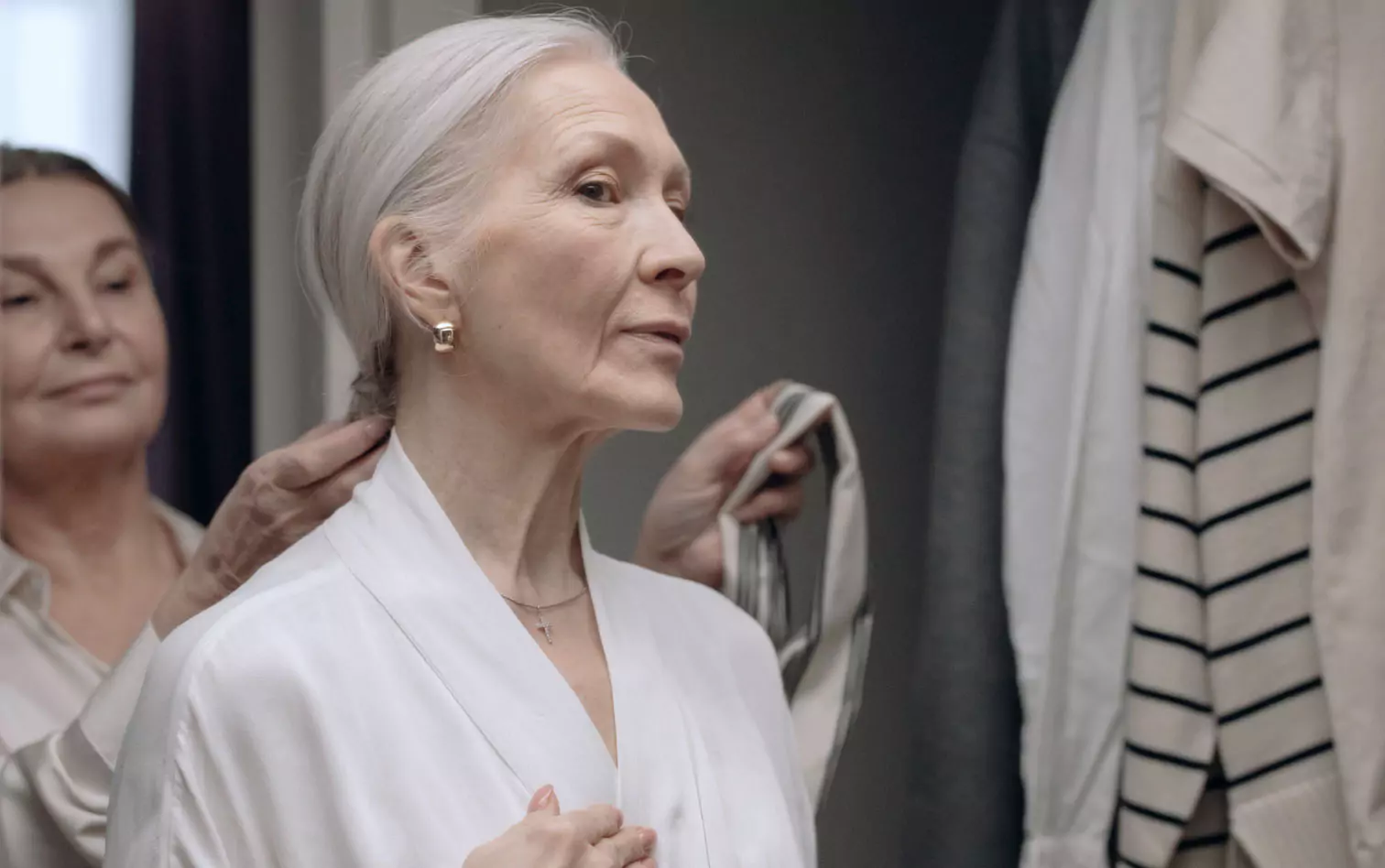
You want to look your best as you age, but it’s not always easy. Your body is a complex organism with numerous features and functions, making repairing any changes or damages in your cells and tissues progressively more complex over time.
As you grow older, these changes are much harder on the body because it is more challenging to repair them. It eventually leads to some of the first most noticeable signs of aging—wrinkles! While you may begin to notice some early signs of aging, there are some that are less noticeable. Making it important that your doctor monitor these changes during your yearly visits. Here’s what you may experience as you grow older:
Your Bones Become Thinner

As you reach middle age, your bones may become weaker and lose density. It happens because as you get older, your body may begin to reabsorb calcium and phosphate from your bones, weakening them. When you are young, your body will (usually) leave these minerals untouched.
Since your bones are tissues that constantly break down and are replaced, weakening bones can develop into a host of health issues. One such issue is osteoporosis—this is when your bones become extremely weak and brittle. If it progresses, they can get fractured by the simplest daily activities, like bending or coughing.
Your Arteries Become Stiffer

As your body ages, your arterial walls will begin to stiffen. It’s why people often discover that their blood pressure rises slightly as they get older. It is typical for the aorta—your main or root systemic artery—to get stiffer, thicker, and less flexible over time.
Another common age-related condition is arteriosclerosis. It occurs when your arteries begin to harden due to the fatty plaque inside your blood cells, causing them to narrow—which may eventually lead to a block. Your doctor will likely monitor this during your yearly visits and suggest necessary treatments.
You Might Experience Forgetfulness

At any age, memory lapses can be frustrating and embarrassing. But as you grow older, it’s inevitable to experience some subtle alterations to your thought processes. Still, sometimes, these shifts come sooner than expected. There are many reasons that you may experience forgetfulness as you age.
Some of these reasons are naturally occurring causes like age. For example, it's natural for the hippocampus to deteriorate a bit as you age, for blood flow to decrease to the brain, and for a decline in the hormones and proteins that repair brain cells to occur. Sometimes, your forgetfulness may be the first sign of a more severe condition like Alzheimer’s disease, a form of dementia, that your risk of developing increases with age.
Your Digestive System Slows Down
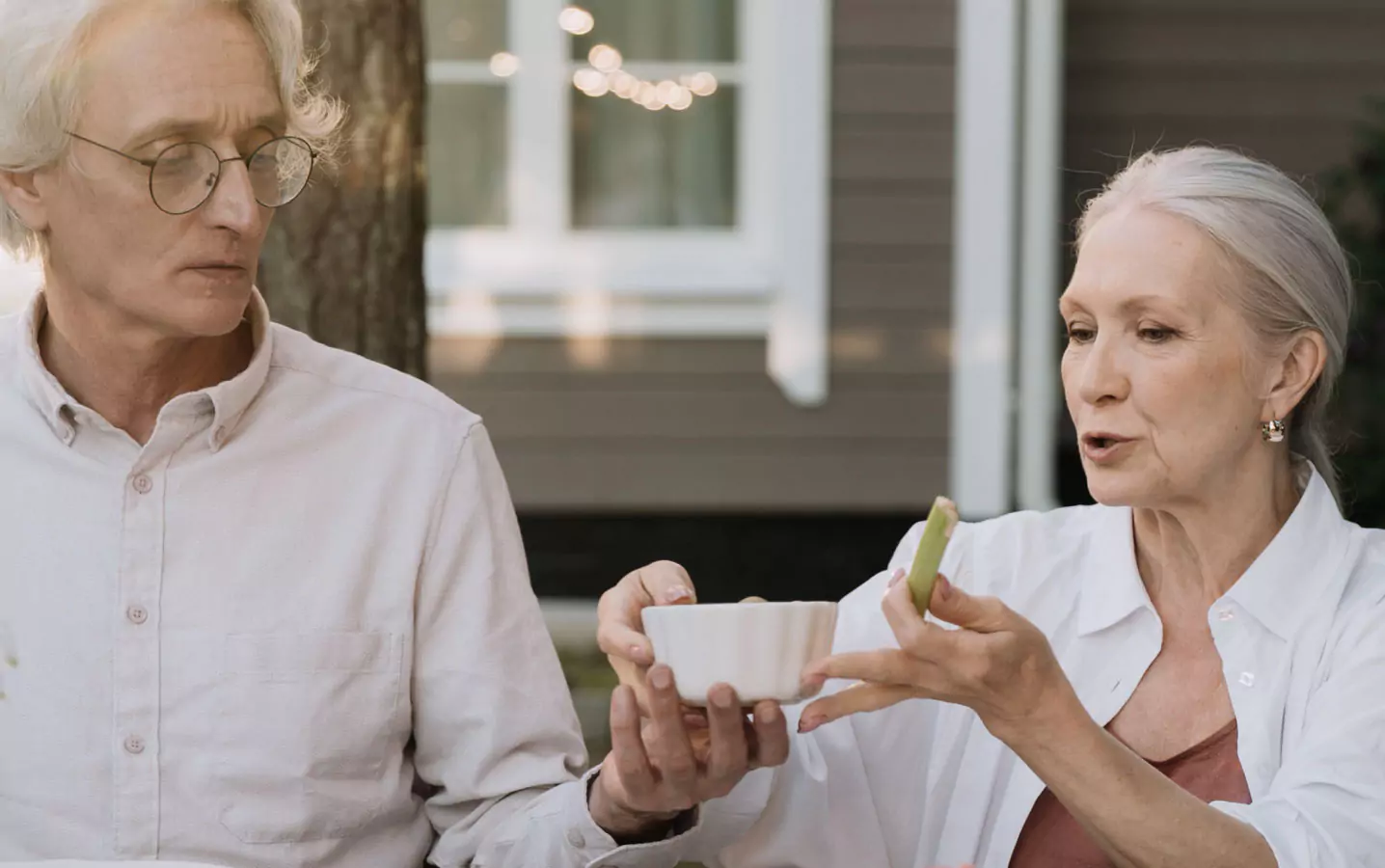
As your body ages, you may begin to see changes in your digestive system. Your digestive system is responsible for passing food through your body using muscle contractions, and it may start to slow down as you age. It is vital to keep track of your digestive health as you age to absorb the nutrients you need and prevent issues like incontinence or constipation.
Your Skin Loses Elasticity
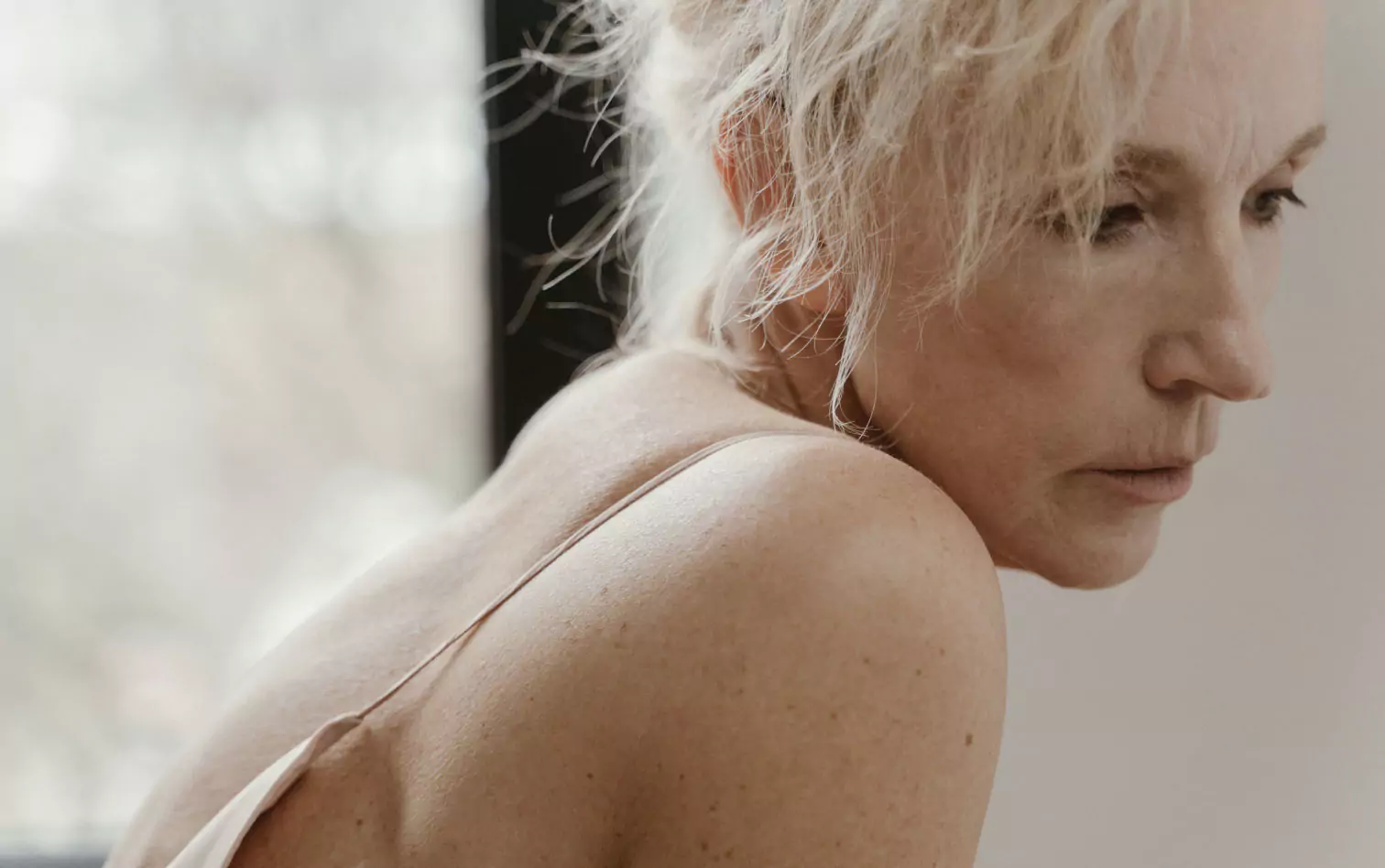
Losing skin elasticity is a natural part of the aging process, and many things may cause noticeable changes like wrinkles or loose skin as you get older. How healthy your skin remains as you age will often depend on your lifestyle and genetics. It will change depending on your dietary choices, how much time you spend in the sun, weight fluctuations throughout your life, chemicals that you are surrounded by, and much more.
Your Body’s Natural Blood Glucose Management Changes
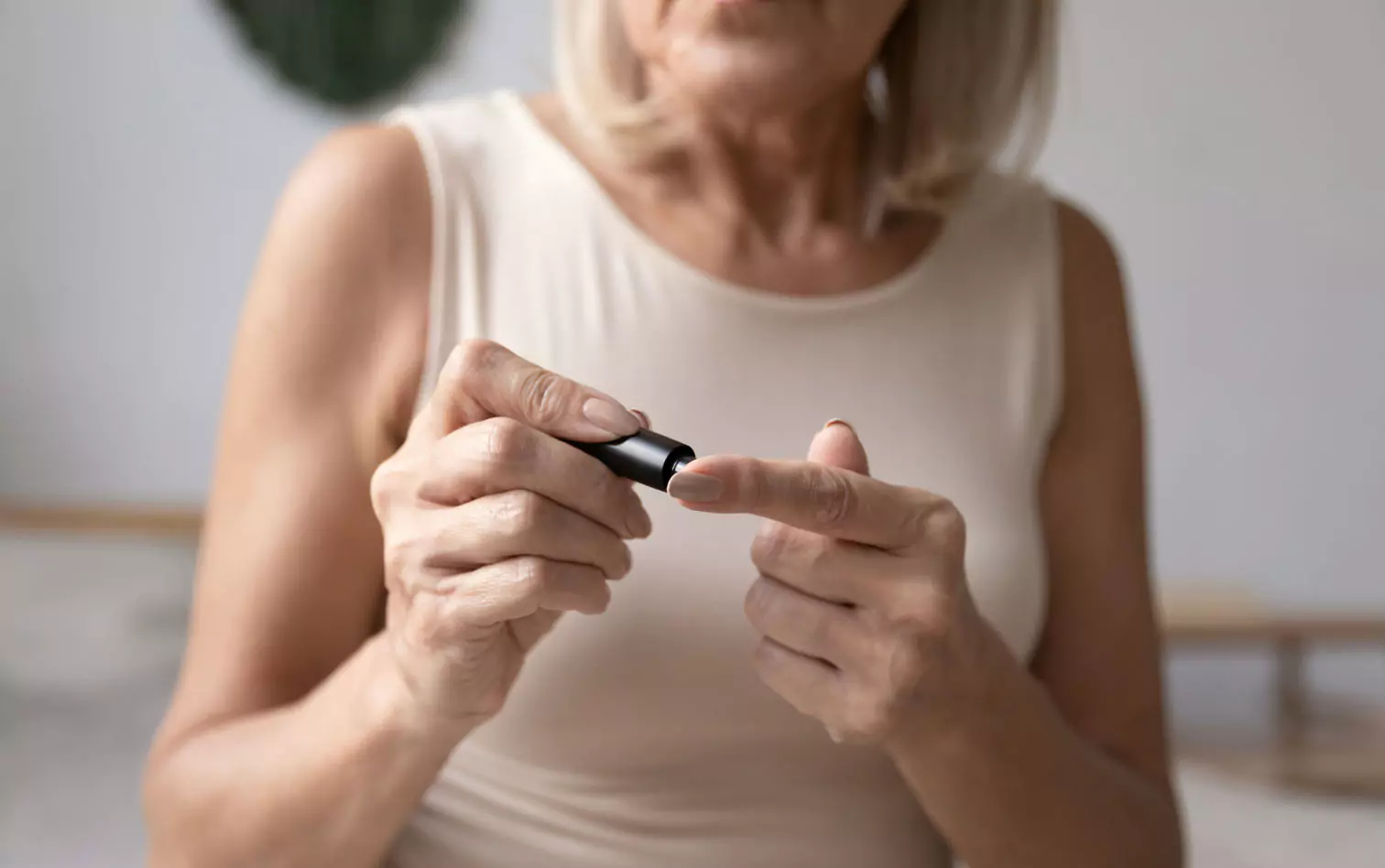
By now, you know your body changes a lot as you age. It means that you’ll begin to see changes in everything from your energy levels and weight to hormone production and blood glucose management. As you grow older, your body may not utilize insulin as well as it could in your youth.
As you age, your muscles and tissues start to lose their sensitivity to insulin, so sugar remains in your bloodstream for an extended period. As this happens, you may find that you are experiencing more blood sugar spikes. It will be necessary, especially if you have diabetes, to closely monitor your blood sugar trends as you age. Using a tool like a continuous glucose monitor can be helpful here!
Healthy Aging Tips for Getting Older Gracefully
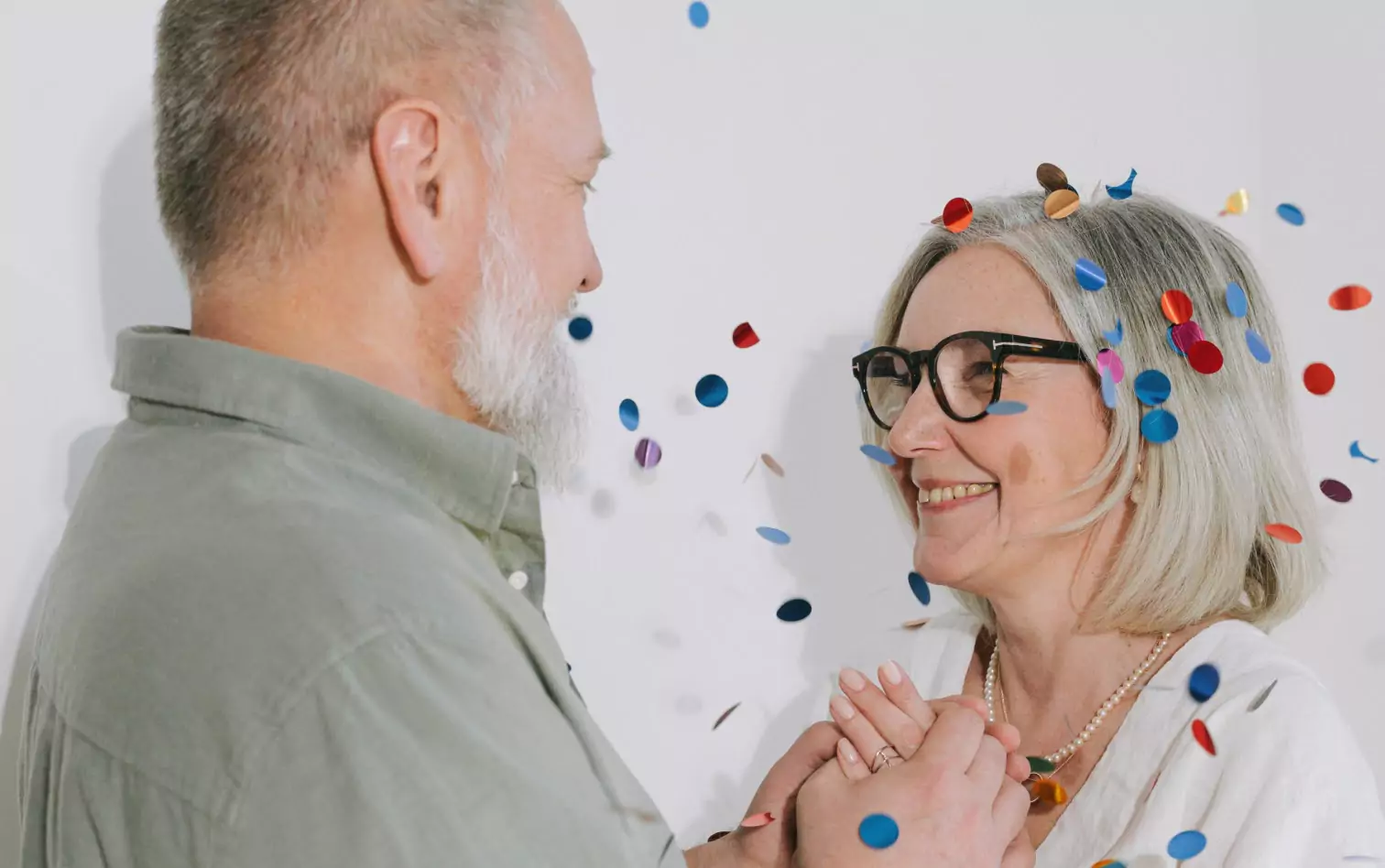
All the changes your body starts to go through as you age can be somewhat overwhelming, and it’s normal to feel like throwing your hands up in despair over it all. But you don’t need to feel this way! You can do many things to take control of your body and put processes in place that allow you to age healthily.
Of course, staying healthy always requires a commitment to your lifestyle and diet, regardless of how old you are. If you’re wondering what you can do to make sure you can enjoy life to the fullest as you grow older, here are a few tips and tricks:
1) Practice Regular Exercise
Exercise is key to healthy aging. Staying active as you grow older can vastly improve your quality of life and prevent conditions from developing. Regular exercise may help with the following:
- Balance: This may help you prevent falls as you become older.
- Sleep: Getting an adequate amount of good quality sleep is essential. While research is ongoing, moderate exercise may help increase the amount of slow-wave sleep you get.
- Blood Pressure: Regular exercise may also help regulate blood pressure levels.
- Stress: Physical activity not only helps you sleep better, but it also may help reduce feelings of stress and anxiety.
- Disease Prevention: Regular exercise may prevent diseases like heart disease and arthritis and also help maintain symptoms of diseases like diabetes.
- Energy Levels: Staying in shape can help improve your energy levels and endurance, which may help you improve your quality of life as you age.
- Mood: Exercise has been known to be a mood booster and may help reduce feelings of depression as you age.
Tips to Maintain Maintaining Physical Activity:
- Start slow. Begin with 10 minutes of activity and work your way up at a moderate pace, five minutes at a time.
- Make activity part of your daily routine—take a walk after dinner, try to walk instead of driving short distances, or take a break from sitting and move around a bit in between your workday.
- Be open to trying new things. Try different types of activity and be patient until you find one that feels fun. It will help you build a sustainable habit that brings you joy while meeting your goals and setting yourself up to age healthily.
2) Follow a Healthy Diet
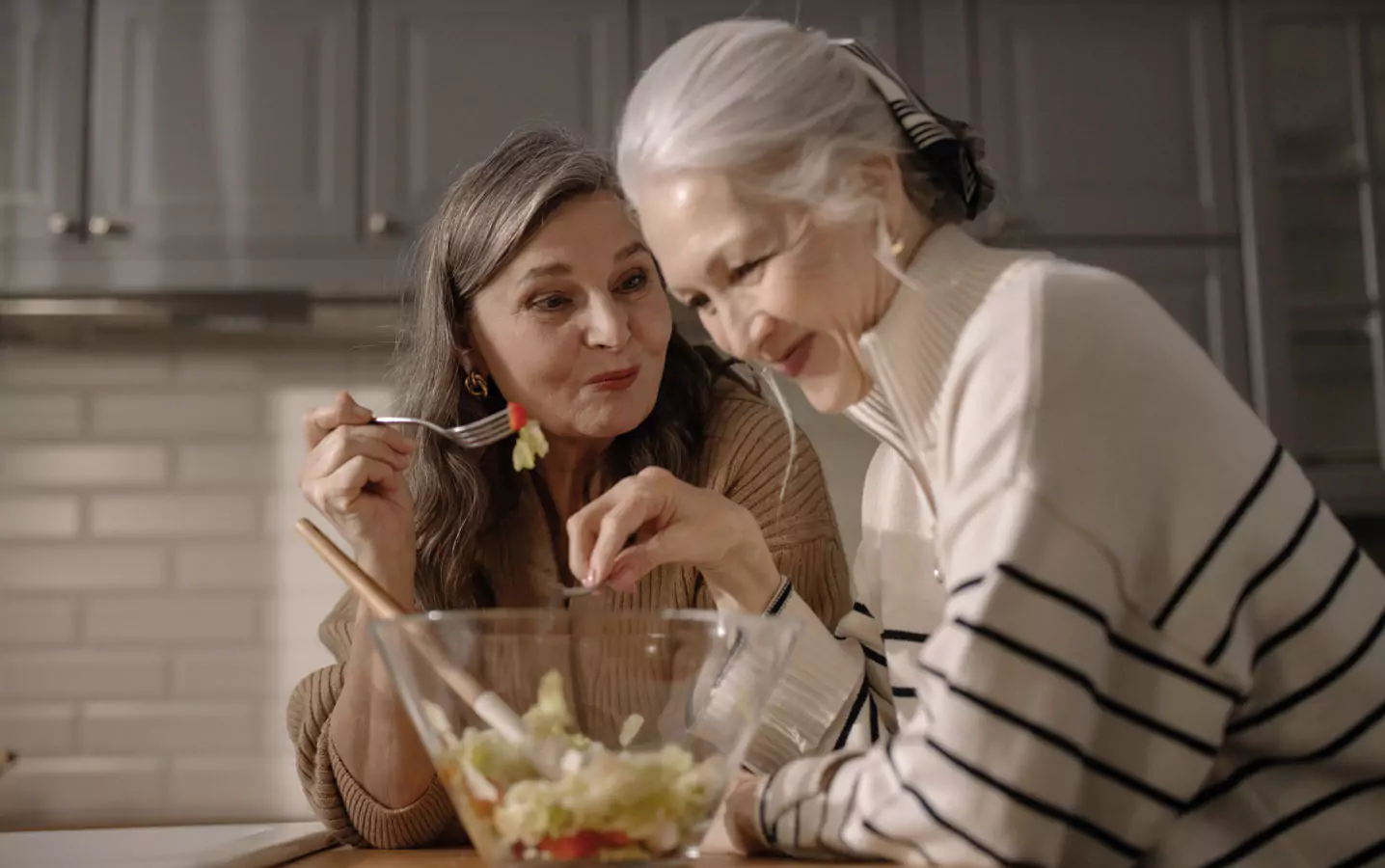
A healthy diet is a crucial part of living a healthy life, regardless of how old you are. But as you get older, it becomes increasingly important to follow a healthy diet. Remember that this will look different for different people—there’s no one-size-fits-all diet. Your dietary needs will depend on your genetics, any health conditions you have, your level of activity, and your age.
Tips for Healthy Dietary Habits:
- Develop an understanding of your body’s needs. You may need different nutrients, calories, or even fiber levels than others.
- Create a routine to follow for meals. It will help you make healthy food choices and prevent over or undereating.
- Opt for high quality protein, healthy fats, fresh fruits and vegetables, and whole grains, over-processed and refined foods.
3) Take Good Care Of Your Skin
Even if you take precautions and always wear sunscreen, you may still notice your skin becoming more loose, and wrinkles beginning to develop. But, you can prevent the acceleration of skin aging by developing good skincare habits. These habits may help you prevent fine lines and wrinkles, skin cancer, tough skin, scars, and loose skin.
Tips for Good Skin Care:
- Protect your skin from UV rays by wearing sunscreen, a wide brim hat, and avoiding long periods of exposure from the sun when possible—this includes tanning beds.
- Discuss a skin care routine that includes products that address your skin concerns with a dermatologist.
- Ditch the cigarettes. Smoking can cause cancer and dehydrate your skin.
- Follow a healthy diet. Overeating refined sugar and saturated fats can cause skin problems to develop.
4) Look After Your Mental Health
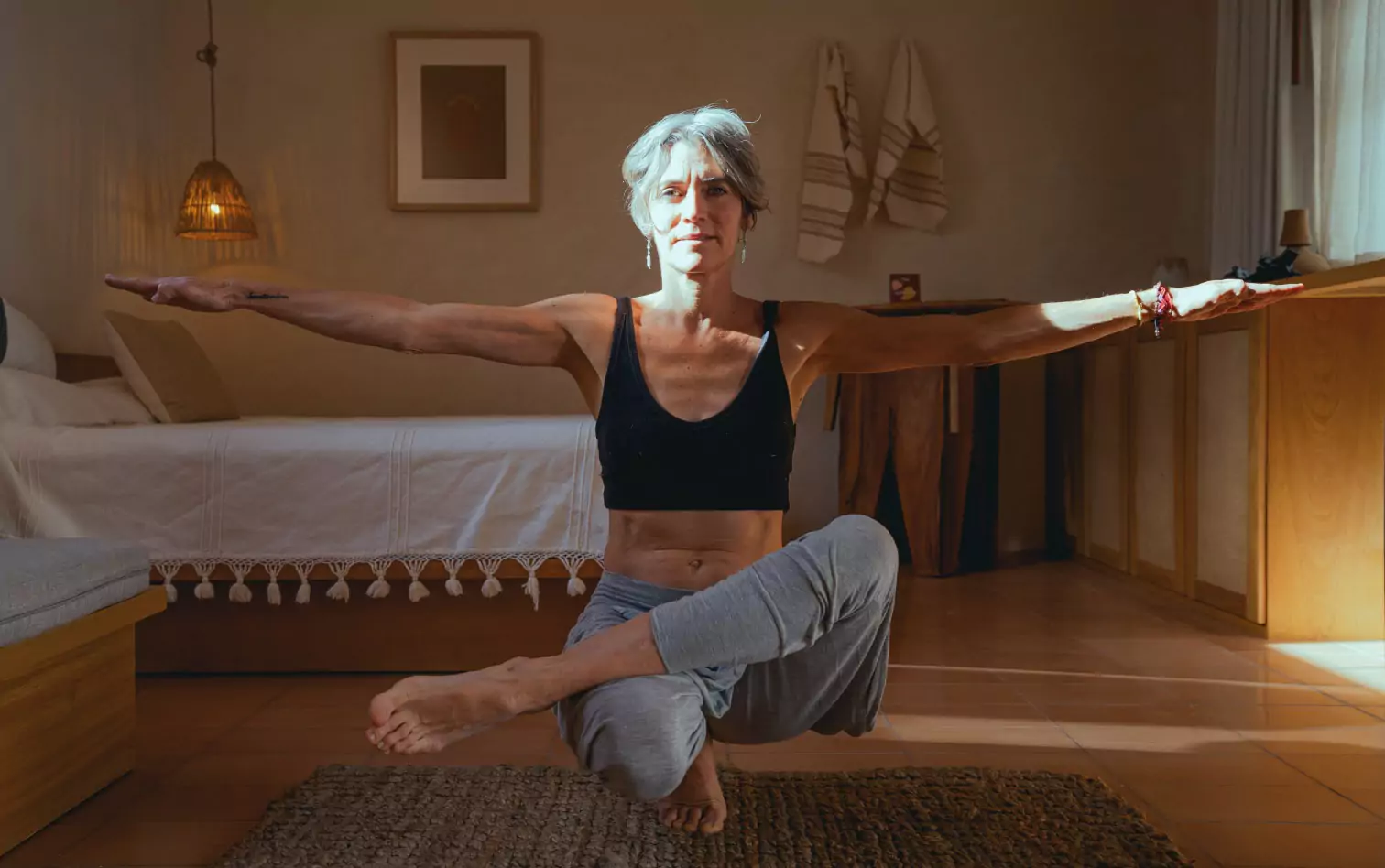
According to the CDC, an estimated 20 percent of people over 55 experienced mental health concerns, including mood disorders, anxiety, or cognitive impairment. Mental health is an often overlooked part of overall wellbeing, and if ignored, can lead to poor quality of life, increased mortality, and diminished bodily functions. It is important to begin paying attention to your mental health when you’re young—it’s just as important as your physical health.
Tips for Good Mental Health:
- Don’t ignore feelings of sadness or anxiety. Stress may be causing some of these things, but if you leave these feelings unchecked, they could develop into something more severe like chronic depression.
- If you’re experiencing mental health problems, avoid consuming alcohol or smoking, which worsen symptoms of depression and anxiety.
- If you think you may be struggling with your mental health, speak to a doctor or mental health professional immediately.
5) Quit Smoking
When you think of smoking and its effects on your health, you may immediately think of your lungs and cancer risk. However, smoking can also affect the rate at which your skin ages, leave you more susceptible to disease, and diminishes your skin’s ability to heal. The chemicals in cigarettes, including nicotine, lead, and ammonia, can cause premature aging and wrinkles.
Tips to Quit Smoking:
- You can find many resources to help you quit smoking. While you can’t always reverse every effect smoking has on your body, you can prevent further issues from developing.
- Speak with your doctor to develop a plan and get help if you are overwhelmed by the thought of giving up cigarettes.
6) Reduce the Amount Of Alcohol You Consume
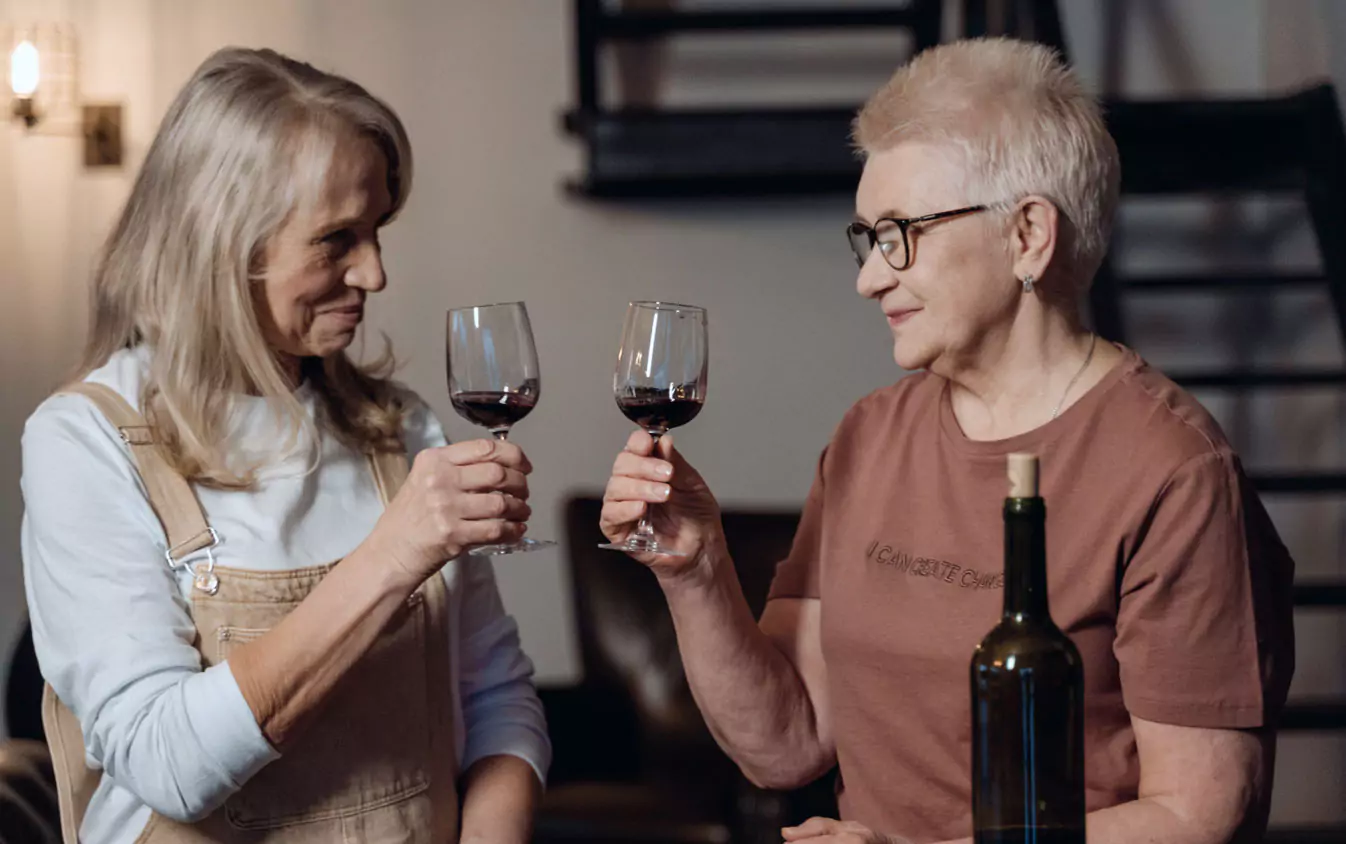
It’s okay to enjoy the occasional drink with friends, but heavy drinking has many adverse effects on your health and may affect how you age. Alcohol consumption can speed up your aging process and make your body unable to maintain itself properly.
Tips for Alcohol Consumption:
- According to the “Dietary Guidelines for Americans 2020-2025," adults of legal drinking age can choose not to drink or to drink in moderation by limiting intake to one (for women) or two drinks (for men) a day.
- If you cannot reduce your drinking levels on your own or feel dependent on alcohol, reach out to your doctor. They can help you develop a plan to reduce your intake and create a healthier lifestyle.
7) Get Regular Checkups
Visiting the doctor for a yearly checkup may feel like a chore, but it will be increasingly important to do this as you begin to grow older. Consistent visits will help your doctor track any changes in your health and lifestyle. Not only will this help you maintain a healthy lifestyle, but it will also help them identify any other severe health conditions that you may develop as you age.
Tips for Maintaining a Regular Checkup Schedule:
- Work with your doctor to make sure you’re visiting often enough. Be honest about your habits and any genetic conditions. This information may influence how often you need specific tests and screenings as you age.
- Log your scheduled appointments on your phone so that you get notifications and never miss an appointment.
8) Get the Sleep Your Body Requires
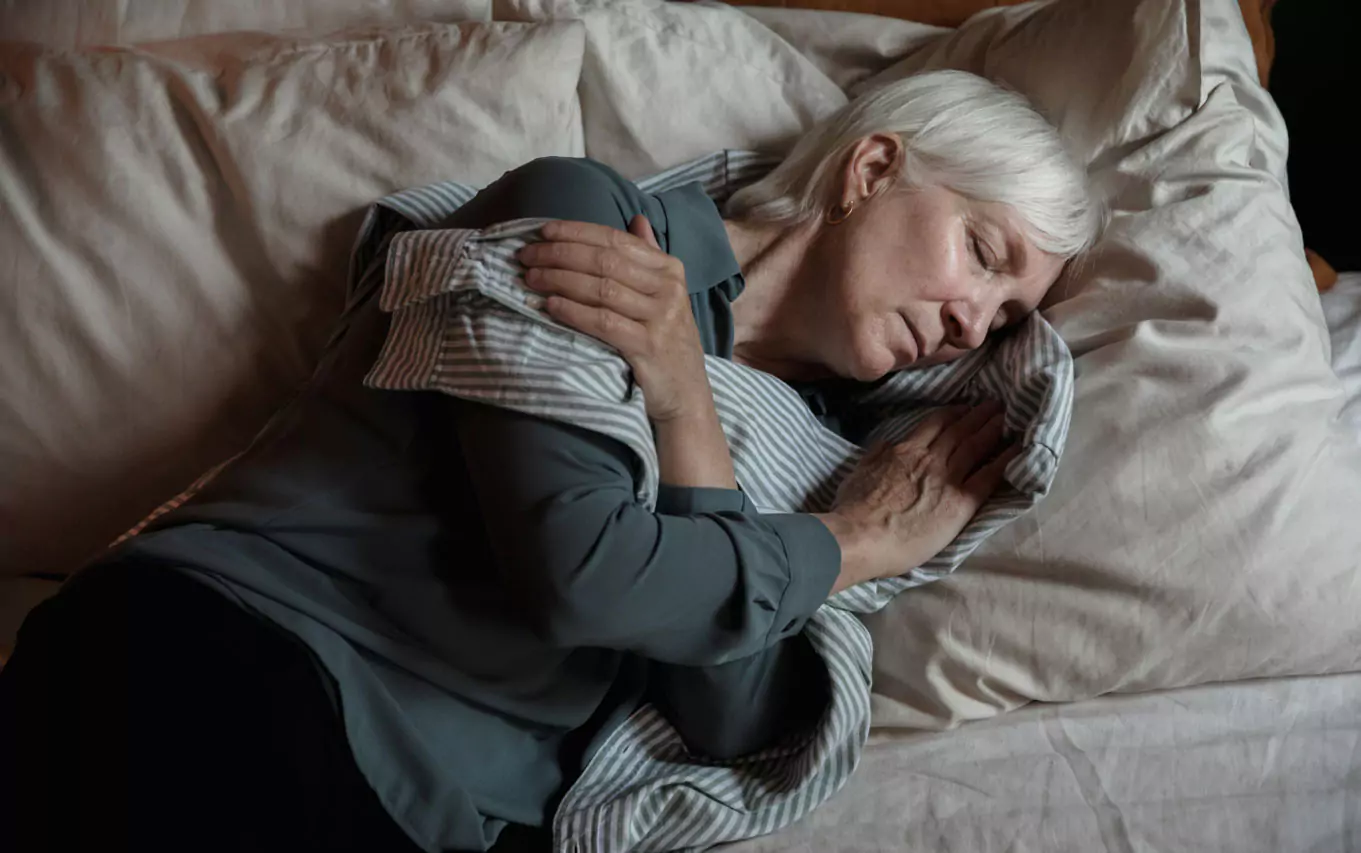
Sleep is an often underrated part of maintaining good health. It’s easy to work and party late and forgo those crucial hours our body uses to reset and repair itself. Your body repairs your heart and blood vessels when you sleep, and as you age, this can get more challenging. As you age, you may begin to regret those lost hours of (literal) beauty sleep.
Tips for Better Sleep:
- Stick to a regular sleeping schedule, and create a space that encourages good sleep hygiene.
- Aim for seven to nine hours of sleep every night. Depending on your genetics, age, and health conditions, you may need more.
9) Take Your Medications as Directed
As you age, you may need to take medications for age-related issues. It means taking them on time, as directed, and following any other requirements like taking them with food, before or after a meal. If you don’t take your medicines as directed, you may find that your health conditions worsen and negatively affect your aging process.
Tips to Take Your Medication Seriously:
- Set a timer for your medications. That way, you won’t miss a dose.
- Keep a spare bottle of your prescription on your person so that if you travel, you won’t miss a dose even if your luggage is lost.
10) Find New Ways To Have Fun!

Getting older doesn’t mean that you need to stop exploring life and learning new things. It doesn’t mean you have to stop making friends or pursuing romantic interests either! But it does mean that you have to be more careful with your body. Still, it doesn’t mean that you have to be overly cautious or afraid of trying new things. Challenge yourself to begin new hobbies and meet new people.
Tips to Find More Fun in Your Life:
- Keep an open mind. As you grow older, you may have set habits and routines, but try to ensure that that doesn’t prevent you from saying “yes” to something new.
- Challenge yourself. Challenge yourself to try new things and explore new interests. It’s never too late to try that dance class or pick up that book that you want to read.
Find the right Nutrisense programto turn insight into progress.
Go Beyond Glucose Data with Nutrisense
Your glucose can significantly impact how your body feels and functions. That’s why stable levels are an important factor in supporting overall wellbeing. But viewing glucose isn't enough. Nutrisense, you’ll be able to learn how to use your body's data to make informed lifestyle choices that support healthy living.
One-to-one coaching
Sign up to access insurance-covered video calls to work with a glucose expert: a personal registered dietitian or certified nutritionist who will help tailor your lifestyle and diet to your goals.
Monitor and measure what matters
With the Nutrisense CGM Program, you can monitor your glucose with health tech like glucose biosensors and continuous glucose monitor (CGM)s, and analyze the trends over time with the Nutrisense App. This will help you make the most informed choices about the foods you consume and their impact on your health.
Find your best fit
Ready to take the first step? Start with our quiz to find the right Nutrisense program to help you take control.

Natalie received her degree in Dietetics from Mansfield University and a Master’s in Clinical Nutrition from the University at Buffalo. Her career has included nutrition education and program development in her local community, adjunct faculty at several collegiate institutions, and clinical nutrition in both inpatient and outpatient settings.



